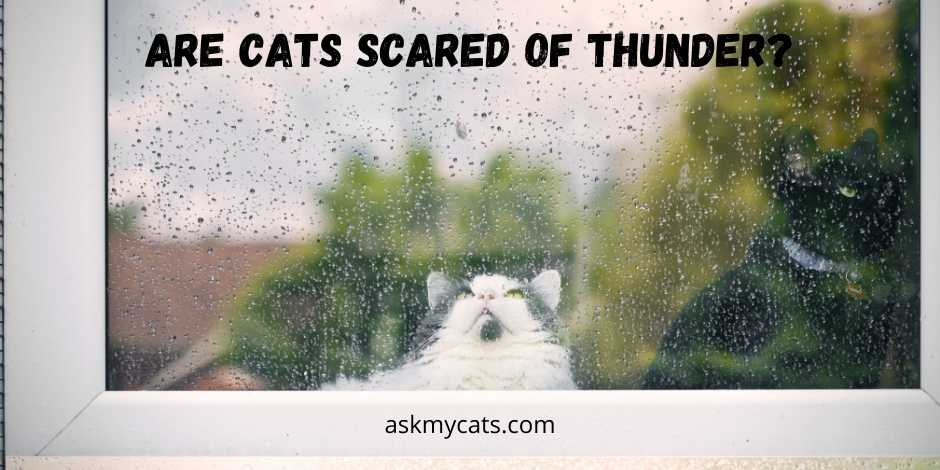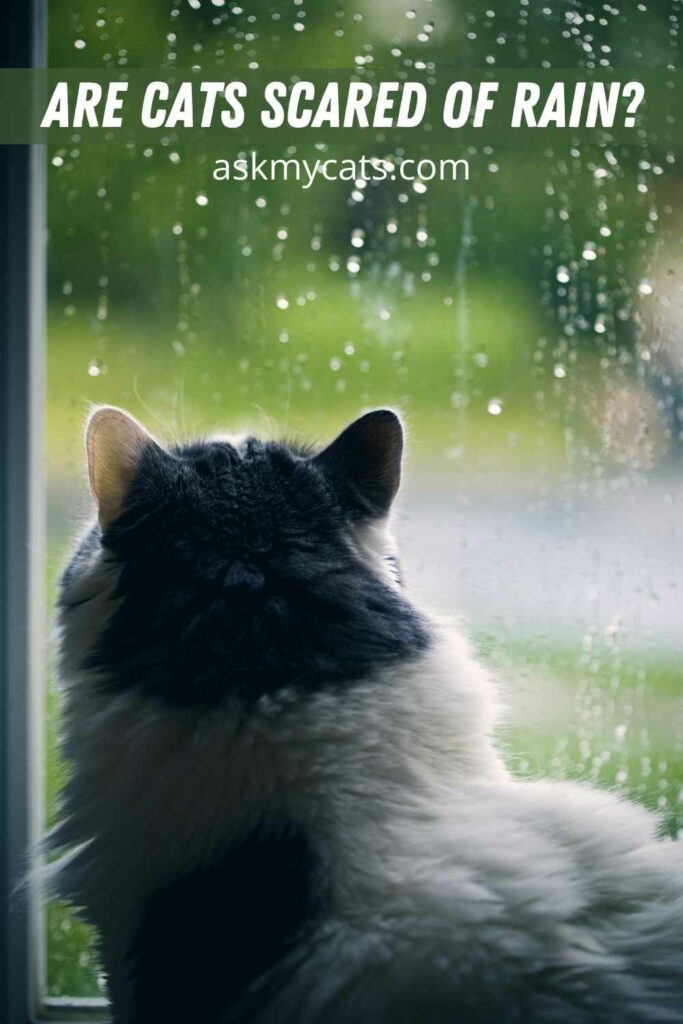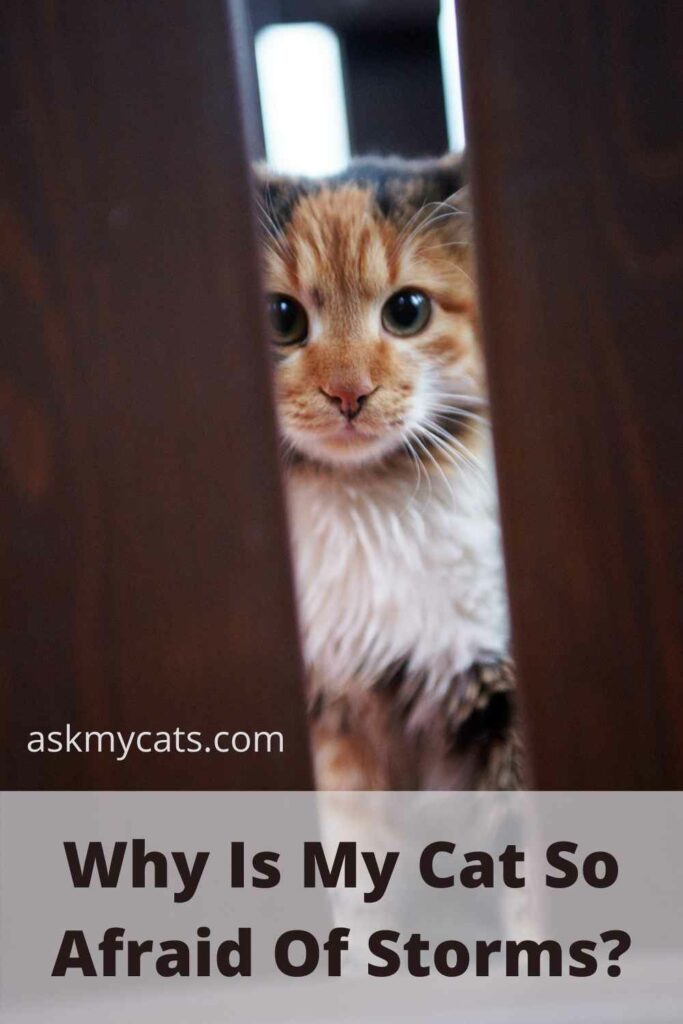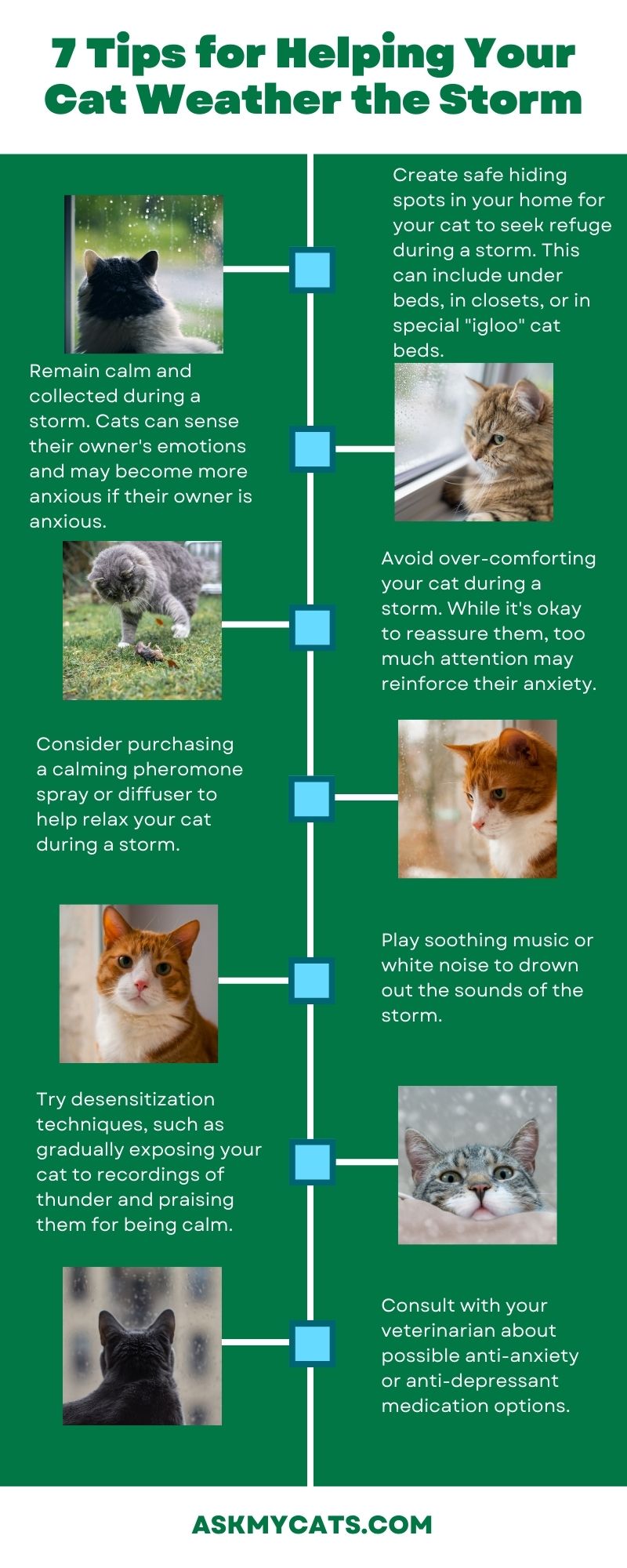Animals can be frightened by thunderstorms. When we think about storms, we typically think of dogs as the ones that become terrified during noisy events such as thunderstorms or fireworks.
Thunderstorms may cause cats a lot of anxiety. While cats may not express their fear in the same manner that dogs do, they can nevertheless get highly scared.
Cats have long been considered the more independent house pet; but, just because they aren’t pacing, whining, or barking like their canine counterparts doesn’t mean they aren’t affected by storms or loud noises.
Key Takeaways
- Cats may become scared of thunder and lightning, especially if it is loud and close by, and may seek shelter in a safe spot until the storm passes.
- Cats may exhibit anxious behavior during a storm, such as clinginess, restlessness, and pacing, but this is normal and should return to normal once the storm passes.
- To help a cat feel more comfortable during a storm, provide extra hiding spots and remain calm, but do not reinforce their anxiety by over-comforting them.
- Windy weather may also scare cats, as they may associate it with storms. Cats may become more sluggish and weary in cold weather and may experience seasonal affective disorder.


Give Your Cat the Perfect Day
Get the Free Ebook!
Are Cats Afraid Of Thunder And Lightning?
Cats get extremely frightened if sudden thunder and lightning take place. This is because they are not accustomed to hearing such noises.
Cats would generally seek refuge beneath beds or in dark, quiet areas if disturbed. Unlike dogs, they seldom reach the phobic stage; instead, they wait out the storm in their safe spot and emerge once the storm has passed.
However, there are certain things you can do to make your cat feel more secure during a storm.
If your cat prefers to hide beneath the bed or in a closet, you should give it some extra cozy hiding spots.
Cat beds in the “Igloo” design might be a fantastic alternative. If you maintain these beds in locations where you and your cats spend a lot of time, they could utilize them to hide from the storm instead of hiding under the bed.
“Cats may exhibit anxious behavior during a storm, such as clinginess, restlessness, and pacing, but this is normal and should return to normal once the storm passes.”
Dr. Rachel Barrack, veterinarian and certified animal acupuncturist
Clinginess, restlessness, and pacing are all common characteristics in cats. Furthermore, these nervous actions may not appear unusual, especially if your cat seeks out a safe haven to wait out the storm.
“Cats, like humans, can be scared of thunder and lightning, especially if it is loud and close by.”
Dr. Sarah Wooten, veterinarian and Certified Fear Free Professional
While severe weather and loud noises are unavoidable, there are a few things you can do to keep a peaceful environment when the time comes.
Remember that nervous behaviors are typical in animals under stressful situations, but if the behavior does not return to normal thereafter, speak with one of our veterinarians.
Our cats catch up on our feelings, so if we’re worried, they’ll be worried too. Reassure your cat, but not too much. However, don’t accept the notion that comforting your cat during a storm will just reinforce or exacerbate her anxiety.
It will comfort her that everything is OK if you remain calm and engage with her in the same manner you typically would.
If you live in a region where thunderstorms occur frequently and for extended periods of time, desensitization may be an option.
This method progressively retrains your cat by gently reminding her of a thunderstorm, such as a recording of distant thunder, and praising her for being quiet. The notion is that the stimulus reaction declines with time.
A visit to your veterinarian is recommended for severe cases of thunderstorm anxiety. Anti-anxiety or anti-depressant medicine can be prescribed by your veterinarian to assist keep your cat quiet during storms.
Must Read: Why Do Cats Go Crazy When It Rains?
Are Cats Scared Of Wind?
Windy weather scares cats because they link it with impending storms.

They’re also perceptive to other people’s feelings. If you are afraid of storms or windy weather, your cat will act in the same way. In windy conditions, it may get scared or worried, just like you.
Weather variations affect your cat’s attitude in the same way they do people. Some of these seasonal mood fluctuations are even eerily similar to human emotions.
The most dramatic shifts will occur between seasons and between bright and stormy days. Your cat may experience the winter blues or despise rainy days and Mondays in the same way that some people do.
It makes no difference whether the cat is an inside or outdoor cat. Cats become more sluggish, weary, and hungry when the temperature gets colder. Seasonal Affective Disorder (SAD) is a condition caused by colder temperatures and a lack of sunshine in certain people (SAD).
Because of the dampness and the loud, abrupt noises, cats detest rainy weather, thunder, and lightning storms. In many unfixed cats, hot weather promotes mating activities, but it can also cause lethargy, hyperthermia, sunburn, and heatstroke.
Cats enjoy moderately warm, sunny conditions. Because their body temperatures decrease somewhat when sleeping, they’ll maintain a suitable temperature while sleeping.
It’s a frequent misunderstanding that cats may only get sick in cold weather. The reality is that your cat can become ill in both extremes (chilling cold and scorching heat).
There isn’t a correlation between cats and windy weather. Whether or whether cats are affected by windy weather is determined by their previous experiences and the strength of the wind.
“Cats may be more likely to experience anxiety or fear during thunderstorms if they have had a negative experience with loud noises in the past, or if they are particularly sensitive to changes in their environment.”
Dr. Jennifer Coates, veterinarian
If you live in an area where windy weather is frequently accompanied by storms, cats and windy weather may not get along. Cats may connect windy weather with impending storms, making them fearful. They’re also perceptive to other people’s feelings.
If you are afraid of storms or windy weather, your cat will act in the same way. In windy conditions, it may get scared or worried, just like you.
Windy weather might also cause items to fall down in your yard or nearby. These noises may frighten cats, as they dislike abrupt, loud noises. Unintentional stress may result as a result of this.
| Behavior of Cats During Thunderstorms | Behavior of Cats During Windy Weather |
|---|---|
| Seek refuge in a safe spot (e.g. beneath a bed, in a closet) | May become scared or worried due to association with storms |
| Clinginess, restlessness, pacing | May become sluggish and weary in cold weather |
| Remain in a safe spot until the storm passes | May experience seasonal affective disorder (SAD) |
Interesting Read: Do Cats Sleep More When It Rains?
Are Cats Scared Of Rain?
Cats are scared of rain because it is often disliked by cats due to the damage it does to their hair.

Their fur becomes thicker as a result of the water, making mobility much more difficult. If they are outdoor hunters, the extra weight makes it difficult for them to hunt effectively.
Cat fur also takes a long time to dry out. Wet fur may make cats exceedingly chilly, causing them to lose body heat. To avoid illness, they must maintain their natural body temperature.
If your cat has been outside in the rain, you must keep it dry. This is especially essential in breeds with long fur coats since the time it takes to dry off is longer.
Rainy weather, on the other hand, does not necessarily harm cats. Water-resistant fur is seen in several breeds. As a result, they can tolerate rain better than other breeds.
These may include, but are not limited to, the following:
- Maine coon
- Bengal
- Turkish van
- Abyssinian
Past experiences, on the other hand, can overrule this. If a cat has had a bad encounter with water in the past, it may develop a phobia of water in general.
This is a typical occurrence with rescue cats. Wetness, chilly temperatures, and other unpleasant sensations may be connected with rain.
Must Read: Do Cats Like Rain? Know The Secret
Why Is My Cat So Afraid Of Storms?
Cats are very scared of storms because they get panicked as a result of the high speed of wind in their surroundings.

Thunder and lightning, with their thunderous rumbles and startling bursts of light, can scare cats. A cat’s natural tendency is to flee such noises since they appear to be dangerous. Adaptive behavior like as hiding during storms has already saved their predecessors. As a result, it has not vanished in household cats.
Cats are used to hiding and waiting out thunder and lightning storms. This habit, however, can be harmful, particularly if they continue to shelter long after the storm has gone.
Though they refuse to leave their hiding place, even if they are hungry, you should be concerned. There might be an underlying problem causing this irritability.
Keep in mind that cats have strong senses as well. They are sensitive to changes in the environment as well as changes in their owners.
According to a study conducted by the American Society for the Prevention of Cruelty to Animals (ASPCA), approximately 30% of dogs and cats experience some form of anxiety during thunderstorms
ASPCA
Some people claim cats can detect the ozone gas created by lightning. As a result, they can detect thunder and lightning storms approaching from that direction.
If their owners are afraid of thunder or lightning storms, their behavior will mirror that anxiety. If you appear afraid and anxious during a storm, your cat will start to act apprehensive and show indications of stress as well.
You might also like to read about are cats scared of the dark
Do Cats Know When A Storm Is Coming?
Your cat’s enhanced senses can detect when a storm is approaching.
Cats and many other animals are more sensitive to noises, scents, and changes in atmospheric pressure than humans, and their enhanced senses can allow them to detect warning signs of impending storms long before their owners do.
Your cat’s inner ears may sense a rapid drop in air pressure just before a storm, and she may have learned to link this with an oncoming storm. She might be able to hear the low rumble of thunder if a storm is already roaring in the distance.
Similarly, she could be able to detect the approaching rain or the distinctive scent of ozone gas, which is commonly produced by lightning and has a harsh, metallic odor.
Why Do Cats Go Crazy During Storms?
Cats go crazy during storms because the rushing winds make them very anxious.
Thunderclaps, pelting rain, and flashes of lightning may make our cats nervous. A cat’s fear of loud noises, particularly thunder, is widespread. This is owing to her incredible hearing sensitivity. She can hear sounds up to 65 kHz, which is nearly two octaves higher than human hearing.
Any pet might be terrified by a sudden thunderstorm, and cats and dogs can get highly anxious during storms. However, there are simple methods to make your pet feel more at ease and prevent them from being overly excited or worried when storms pass by.
Interesting Read: Where Do Stray Cats Go When It Rains?
How Do You Calm A Cat During A Thunderstorm?
Start by ignoring your pet’s nervous behavior if you want to help him or her stay calm during a thunderstorm.
It’s not easy, but pets might misinterpret attempts to calm and soothe them as more attention or a reward for their good behavior. Maintain a calm and relaxed demeanor.
Your pets will pick up on your anxiety or uneasiness during a storm, which will confirm their perception that they have reason to be scared.
Move your pet to a secure location with no windows or doors, such as a completed basement or a tiled bathroom.
This can help your pet feel better by reducing static electricity and pressure, as well as muting thunder noises, and eliminating the visual stimulation of witnessing the storm rage outside.
If your dog chooses to stay in his crate during a storm, cover it with a blanket and distract him with a favorite toy or nutritious food until the storm passes.
Unscented dryer sheets can help decrease static electricity in your cat’s fur, but only lightly massage his coat to avoid leaving a chemical residue.
Cats should not be used since they will lick the residue from their coats. Cats who groom themselves frequently are likewise unsuitable for this technique.
Pet-safe chemicals work to soothe cats and dogs without knocking them out. Consult your veterinarian to establish the appropriate dosage for your pet.
There are a variety of commercially available chest wraps that have been found to assist cats to stay calm during a storm. You may even make your own by swaddling your pet in a towel or an old T-shirt or covering him in a stretchy bandage.
Just make sure your cat doesn’t become too tangled that he can’t breathe.
| Tips for Helping Cats During Thunderstorms | Tips for Helping Cats During Windy Weather |
|---|---|
| Provide extra hiding spots (e.g. Igloo-style cat beds) | Keep cat indoors or provide a secure outdoor shelter |
| Remain calm and engage with cat in a normal manner | Ensure cat has access to warm and comfortable areas |
| Consider desensitization techniques (e.g. using recordings of thunder to gradually retrain cat) | Consider using a light therapy box to alleviate SAD symptoms |
Interesting Read: Why Is My Cat Sitting Outside In The Rain?
Frequently Asked Questions
Do Seasonal Changes Affect Cats?
Cats and humans aren’t all that unlike, especially when it comes to seasonal mood swings. Warmth and sunlight are present throughout the spring and summer, which might help a cat’s attitude and comfort. Heat cycles and mating activities are also triggered by it.
Does stormy weather affect cats?
Because of the dampness and the loud, abrupt noises, cats detest rainy weather, thunder, and lightning storms. In many unfixed cats, hot weather promotes mating activities, but it can also cause lethargy, hyperthermia, sunburn, and heatstroke. Cats enjoy moderately warm, sunny conditions.
Do cats get depressed when raining?
Your cat will most likely become calmer during rain and storms over time. If nothing else works, it’s fine to let your cat hide under the furniture as long as she isn’t at risk of hurting herself or others.
Final Words

Whether you have a cat or a dog that is afraid of thunder, it’s vital to remember that your pet has a valid reason to dislike storms.
Stay cool and provide healthy coping techniques for your pet instead of criticizing or coddling them for their nervous behavior. You’ll make them realize that storms aren’t that bad after all.
Feel free to ask your questions in the comments section below!
Interesting Read: Can Cats Find Their Way Home After Rain?

one of my ats recently died because of a storm. he was a catio cat and always afraid of storms even though he had lots of cover.
the last storm was so bad the sirens went off. i found him dead the next day. he was 12 year old. i think it could have been a heart attack or a close lightning strike that killed him.